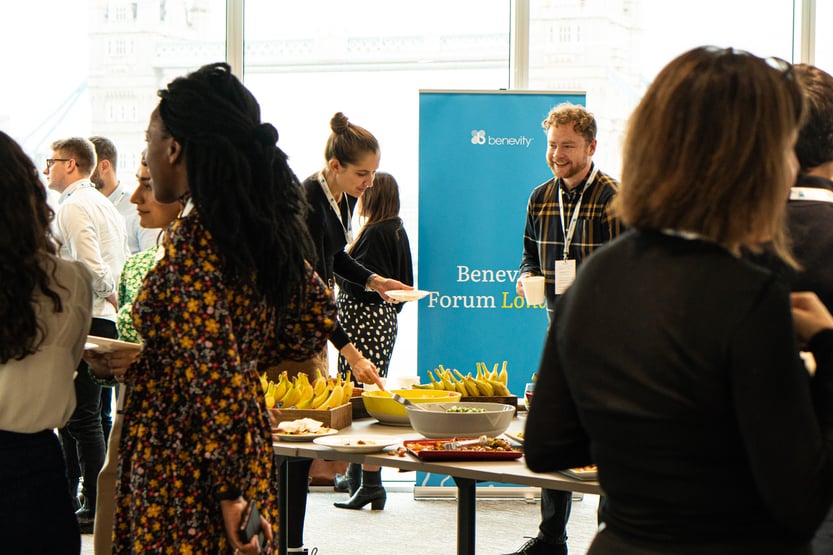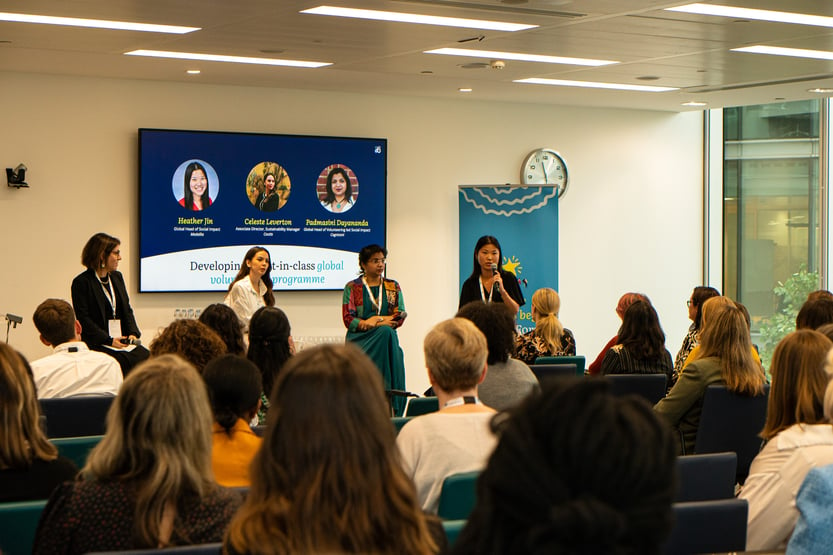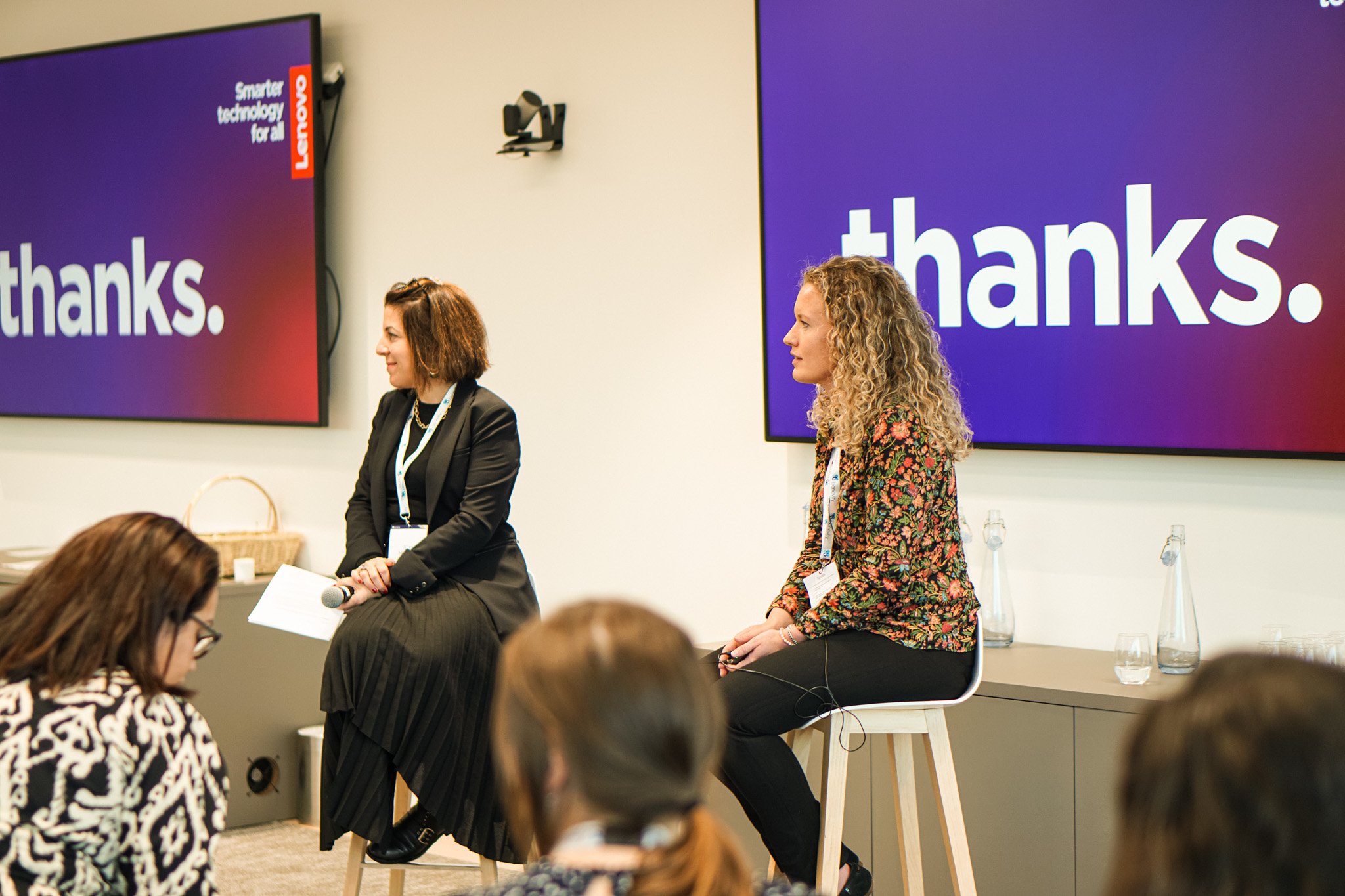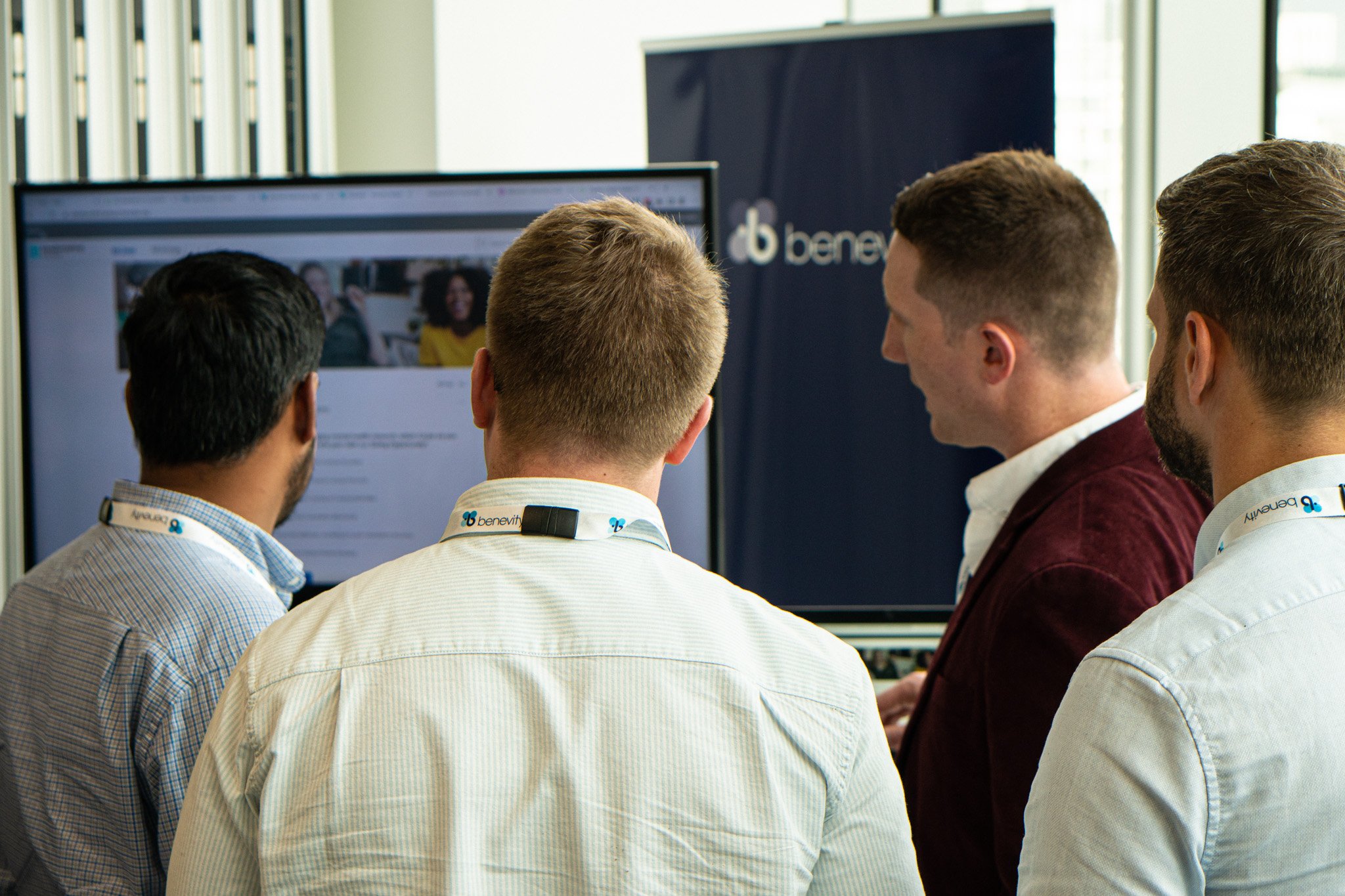4 insights from CSR experts at the UK's most purpose-driven companies
Key learnings from the top purpose event in the UK - the Benevity Forum London

At our first Benevity Forum London, we brought together 120+ individuals from the corporate social responsibility (CSR) space. It was the perfect setting to share, learn and meet with the UK’s most purpose-driven brands.
With talks from Cognizant, Medallia, Coutts, Arm, Lenovo, Wave Utilities, Auto Trader, Sopra Steria and the Felix Project, this event was a full day of connecting in person and benchmarking. Important questions were asked and companies shared their strategies on how we can expand the impact of Goodness and purpose programmes in the UK and beyond.
Let’s look at four key learnings from the event to understand how we can better deliver social impact programmes in the region:
1. Localise your global volunteering programmes for maximum participation
One of the biggest challenges CSR professionals currently face is offering volunteering and giving opportunities that are locally relevant. These programmes should not only address cultural differences, but they need to be delivered to employees in a way that resonates in their region.
There is certainly no easy answer when it comes to building a global volunteering programme that makes a difference at a local level. But our panel – featuring Padmasini (Padma) Dayananda, Global Head of Volunteering-led Social Impact at Cognizant; Heather Jin, Global Head of Social Impact at Medallia; and Celeste Leverton, Associate Director, Sustainability Manager at Coutts – did its best to tackle the topic.

The first part of developing a programme with a global reach is getting stakeholder buy-in from leaders around the world. Padma, whose 20+ years of experience at Cognizant have thrown her into every stage of this process, shared her five business points for investing in CSR:
- Giving is the new branding – One social impact story is worth all the money you’d spend on marketing. Go for the marketing budget and pitch your programme as branding.
- Employee retention – Data shows that employees who volunteer tend to stay 11% longer with Cognizant (collected over the past 15 years). This matters a lot in a market where retention is a huge challenge.
- Talent attraction – An organisation with a purpose matters. Applicants may get three offers – and they do – and they’re going to pick the organisation that touches their heart.
- Team building – For companies the size of Cognizant, the biggest challenge is the hierarchy, the silos and the lack of engagement. To remedy this, they pitch their programme as team building with social impact as a fringe benefit.
- Building a sense of purpose – Connecting employees to a sense of purpose helps promote well-being. Given the emphasis on mental health during the Covid-19 pandemic, it’s proven that volunteering and giving contribute directly to mental health.
Once your leaders around the world have bought into the programme, the next step is making sure the content you share is relevant to employees in all your different areas. One best practice we heard from our social impact leaders is getting input from programme ambassadors who can provide clarity on cultural subtleties. This is crucial when designing a programme for real impact in each region.
Heather from Medallia noted, “We have local or what we call our regional Global Giving Champions, and they are absolutely key in helping us identify what causes our people are passionate about and different engagement techniques to get more of the employees in that region involved.”
This strategy, executed in tandem with their employee purpose solution, has helped them increase employee engagement, retention, and Belonging around the world.
Medallia not only saw a 60% increase in volunteering & a 111% increase in fundraising through the Benevity platform, they were also able to remarkably increase the number of participating countries by 288%.
— Medallia 2022 Global Impact Report
Heather said, “We've had Benevity for about a year, it’s an incredible platform. What we were able to see is that they help us increase both our global retention and our engagement. We have our Voice of Medallia survey, which is our voice Engagement survey that goes out every couple of months. What we saw was that people who use Benevity, so people who volunteer and donate, have a higher score on all of those key drivers and a 10% increase in the sense of belonging.”
Whatever your strategy is, our panellists made it clear that listening to your people is the most important part when delivering a programme that spans cities, regions and countries.
Celeste from Coutts stated, “We enable our employees to choose any opportunity where they want to volunteer. What’s great about it is that it’s regional. On our volunteering and giving platform, Benevity, you can put in your geolocation or remote options, plus they have three days of paid volunteer time off. So, I think it’s that match of empowering them to choose where they use that time, but also giving them that time out of the office to give back – and this is facilitated by Benevity.”
2. Shift the way that ESG functions to put more of a focus on the S
ESG proved to be a principal topic at Benevity Forum London, discussed in two fireside chats and frequently coming up in Q&A. In one of those chats with Monica Hauser, Director of Corporate ESG Communications and Global Philanthropy at Lenovo, she addressed a growing trend: the need for cross-collaboration between environmental, social impact and governance teams.
Because of the size and scale of Lenovo, they have separate teams and subject matter experts who address each part of ESG. And, originally, Monica found that she was quite happy to remain in her area of social impact.
However, over time, she realised the need to break out and shift the way the E and S work together.
If their goal as a social impact team is to help marginalised communities, she realised it is impossible to ignore how natural disasters disproportionately affect underrepresented groups.
“At first, I was sceptical about it. But what I really want you to take away is how much value it has added to our social impact programmes. And whether you’re only focused on social impact and want to look at environmental or the other way around, maybe you’re more focused on environmental impact and want to look at how to engage your employees – it’s a good idea,” said Monica.

While taking time away from your remit and giving it to another area may seem like a waste, Monica urges companies to consider integrating this strategy into their programmes.
To execute this, her suggestion is: “Listen to your subject matter experts. If you’re not already doing the one-to-ones or having regular meetings with your folks in Environment or Governance, that’s the first point of integration to start delivering more value.”
Finally, when it comes to applying this strategy to their global programme, Monica spoke passionately about Lenovo’s methods for complying with ESG standards and reporting.
She said, “There was an appetite for scaling around the world, but we needed software to help us do that. I’ve heard a lot of questions about compliance today, about how you take all of these administrative paths to scale. Don’t do it without a software platform. The manual administration of it is something that you don’t want to spend your time doing because it’s going to take you away from your strategy. Go with Benevity – go with a global platform that’s going to facilitate all of that for you, particularly for compliance."
3. When it comes to world crises, be ready to take action quickly and authentically
When a world crisis hits, companies must respond effectively and efficiently to give employees reliable ways to provide aid to affected areas. This supports employees who may feel helpless in the face of a world disaster, while taking a stance as a company in the face of crisis.
We were joined by Sarah Thake, Tech for Good and Social Value Manager at Sopra Steria, to discuss how the UK branch of their social impact team responds to news of a world crisis.
Their process begins with evaluating whether to respond to any given crisis at hand. Sarah made it clear that it’s impossible to respond to everything and companies should not try to. In fact, it’s better to determine a set of guidelines for the crises that you address at your company.
Sopra Steria finds that their UK team members are most inclined to respond to crises that affect their colleagues in other regions of the world. For example, they have a huge operation in India, so the Covid crisis there was particularly personal to their employees, making it a no-brainer when it came to setting up a response strategy.
With those guidelines in place, the next step is having efficient methods for putting reliable fundraisers in front of employees as quickly as possible.
Sarah said, “Within 24 to 48 hours, you have to have some kind of fundraiser up at the bare minimum that you can then say to employees, right, this is where we want you to direct your attention right now while we figure out what the more cohesive, longer-term response is going to be. But we found, particularly with Covid, we waited maybe a week before we launched that first fundraiser and, within a week, employees had already gone and signed up for the NHS app, they’d already donated to the disaster emergency appeal – we were slightly behind the curve. So that speed and knowing how you’re going to, at least initially at the start, is really key.”
To facilitate this process, they provide their employees with a platform that quickly delivers reliable charities they can donate to right when the news breaks about a crisis. Without the need to vet the content on their own, they can swiftly respond with fundraisers and then continue to build a bigger strategy if necessary.
"Our charities are being publicised on Benevity as the organisations that are working on the ground in the area," said Sarah.
“This is a key criteria for selecting charities for us because we recognise that it's being vetted, and we can trust that the donations are actually going to get to the point that they need to."
Finally, they use their platform to create useful dashboards for different stakeholders across the company. Sarah’s suggestions are:
“When it comes to reporting, ultimately, it needs to be done in a way that is useful for who your audience is. So, our executive committee receives a dashboard that is relevant for their sector. And something that, even for disaster campaigns, has really helped is creating competition. One of our sector directors hates being beaten by the other sector director. So, if his sector is not donating as much as the other, he will put in more of his own money, which creates that kind of internal competition. This massively helps with engagement.”
4. Marry employee-led action on diversity, equity and inclusion (DEI) to CSR
As we’ve all witnessed, the need to address and consider our approaches to diversity, equity and inclusion is crucial. Our employees need to feel seen, understood and supported. But one of the big questions is: how can we marry DEI at our companies with our CSR efforts so they work together to engage our teams in a positive employee experience?

Leading this discussion were Anna Malan, Senior Manager of Community & Inclusion at Arm; Jane Austiun, Human Resources Director at Wave Utilities; and Helen Robinson, Diversity, Inclusion and Community Engagement Manager at Auto Trader.
According to Helen from Auto Trader, engagement for DEI and CSR starts before the individual joins the business.
Following their methodology, companies must consider:
- Employer branding – Start by thinking about how you showcase yourself from an employer brand perspective. DEI is crucial here.
- Onboarding – Next, think about the communication that will be sent out when people join the company, both from a DEI perspective and from a CSR perspective.
- DEI training – Finally, it’s about educating your people. Auto Trader has a day-and-a-half of DEI training that’s provided and delivered internally by members of their people team. Each member of staff goes through that training in their first three months of being in the business.
This strategy gives all employees an understanding of how they can get involved in the CSR programme as well as the commitments of Auto Trader’s employee-led networks (employee resource groups).
Helen added, “Our employee-led networks collaborate with each other on monthly meetings where our network leads join together. That’s an opportunity for not only the network to collaborate together, but [for them] to start thinking a little bit more deeply in terms of intersectionality. And that’s where we get more involvement with our CSR team, and we start to think about how we can support our networks with fundraising initiatives. Finally, we use Benevity to get an understanding from a data perspective of how much we are funding our local communities.”
Over at Arm, their structure includes teams dedicated to sustainability, DEI and Anna Malan’s remit – the employee community engagement programme. Both their sustainability and DEI teams have their own focuses, with Anna’s CSR strategies serving both.
She said, “Our overarching sustainability missions are to ensure that everybody, everywhere, is benefiting from technology. Then, the priority for our DEI programme, which is still quite new, is to create a sense of belonging for our people, where every voice can be heard in the organisation. So, within my programme, we have a strategic focus on STEM outreach for young people, and we’re also trying to get our people thinking about how we extend the benefits of technology to everyone, everywhere.”
To close the session, Jane from Wave Utilities provided clear advice for companies that reflected the underlying message of the day:
“When it comes to both DEI and CSR planning, don’t compare yourself with any other organisation. Because when we began, we just thought, ‘We’re not a large corporation, so are we really going to be able to do anything?’ And we’ve done absolutely loads. It doesn’t matter if you’re the smallest or largest company, you can make a difference.”
See How ERGs Are Creating a Sense of Belonging at Companies
Keeping a pulse on future CSR and ESG trends
Our Benevity Forum events play a pivotal role in revealing regional trends that we know will impact the future of doing good. Keep an eye out for future learnings coming from our upcoming forums in Paris, Munich and Sydney, and of course our annual Benevity Live! event happening next May in the United States. You won’t want to miss these insights from the world’s most purpose-driven brands!
